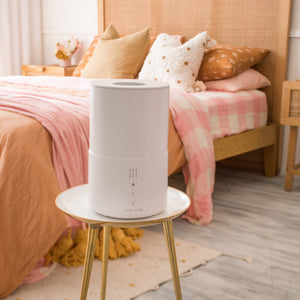Exploring ADHD and Essential Oils: Benefits and Uses
People are always searching for ways to improve their focus and concentration, especially in today’s fast-paced world. This is particularly true for those who struggle with ADHD. While traditional treatments like therapy and medication are important, many are also turning to alternative therapies like essential oils for ADHD symptom management. But do ADHD and essential oils really mix?
Interest in using essential oils for ADHD is on the rise, with many people seeking natural ways to alleviate symptoms. However, it is crucial to understand both the potential benefits and limitations before incorporating essential oils into an ADHD management plan.
Table of Contents:
- Understanding ADHD
- The Potential of Essential Oils
- Using Essential Oils Safely and Effectively
- Holistic Approaches and Additional Support
- FAQs About ADHD and Essential Oils
- Conclusion
Understanding ADHD
ADHD, or Attention Deficit Hyperactivity Disorder, is a neurodevelopmental condition affecting millions of children and adults worldwide. The CDC estimated in 2016 that 6.1 million children had been diagnosed with ADHD. ADHD is characterized by challenges with focus, impulsivity, and hyperactivity, leading to difficulties in academic, social, and work settings.
People with ADHD often find it hard to stay on task, control impulsive behaviors, or sit still for extended periods. The symptoms vary in severity from person to person. It is important to remember that ADHD is a complex disorder with no one-size-fits-all treatment approach.
While traditional approaches, like behavioral therapy and medication, form the cornerstone of ADHD management, complementary therapies, like the use of essential oils, are gaining traction. A potential benefit of essential oils is their ability to reduce ADHD symptoms naturally.
The Potential of Essential Oils
Essential oils are concentrated plant extracts that capture the natural fragrance and beneficial compounds found in flowers, leaves, roots, or other plant parts. Extracted through distillation or cold pressing, these potent oils are widely recognized for their therapeutic and medicinal properties.
They work by stimulating the olfactory system, the part of the brain responsible for processing smells. Research has shown that the aroma of essential oils can influence behavior by impacting both the endocrine and central nervous systems. When inhaled, these aromas activate smell receptors in the nose, transmitting signals to the limbic system, the brain area associated with emotions, memories, and behaviors.
Essential Oils and ADHD
Essential oils, often used in aromatherapy, offer a natural approach to potentially alleviate certain ADHD symptoms. While research is ongoing and more substantial evidence is needed, many individuals turn to specific oils like vetiver, lavender, and rosemary to manage symptoms like inattentiveness, hyperactivity, and anxiety. Some believe that essential oils can improve ADHD symptoms.
However, remember that essential oils should complement, not replace, traditional treatment methods for managing ADHD. It is not recommended to treat ADHD with essential oils in place of traditional treatment.
Lively Living Senstive Child Organic Blend
We a strong following of mums using and recommending their quality, affordable, certified organic essential oils, it wasnt long before we had requests for a oil blend suitable for children to support ADHD and we knew that meant a oil with Vetiver in it and hence the Senstive Child Blend was born, Helping klds stay calm and enjoy deep sleep, it is considered a mircale in a bottle for many Australian families.
Vetiver Oil for Focus and Alertness
Vetiver oil is derived from a perennial grass native to India. This oil, known for its earthy and grounding aroma, is believed to have calming effects and may enhance alertness. It is thought that vetiver oil may be a helpful oil to improve mental clarity.
Research suggests that vetiver oil may possess anti-anxiety properties comparable to the drug diazepam. One study used vetiver oil in aromatherapy for relaxation.
Lavender Oil for Relaxation
For centuries, people have turned to the soothing aroma of lavender essential oil to ease restlessness and promote sleep. This floral scent is believed to alleviate stress and improve mood, potentially beneficial for individuals with ADHD. Many people believe that lavender oil can reduce anxiety and improve ADHD.
A recent study from the University of Minnesota explored the effectiveness of lavender oil in enhancing sleep quality for people with sleep issues. The findings indicated those who inhaled lavender oil experienced better sleep than those who did not. Over time, the consistent use of inhaled lavender oil also appeared to boost overall well-being.
Rosemary Oil for Cognitive Function
Extracted from the rosemary herb, rosemary essential oil, with its invigorating herbal aroma, has a longstanding reputation for enhancing memory and concentration. It may be a good essential oil to improve mental clarity.
In a study published in Therapeutic Advances in Psychopharmacology, researchers investigated the effects of 1,8-cineole, a key component of rosemary oil, on cognitive function. The results suggested a link between higher levels of this compound in the body and better performance on tests, with improvements seen in both the speed and accuracy of responses. Additionally, those with higher 1,8-cineole levels described feeling more content, suggesting potential mood-boosting effects.
Other Essential Oils to Consider
Beyond vetiver, lavender, and rosemary oils, several other essential oils have garnered attention for their potential benefits in managing certain ADHD symptoms. Citrus oils, like sweet orange oil, may have an uplifting effect and could also be beneficial.
| Essential Oil | Potential Benefits |
|---|---|
| Frankincense | Focus, calmness, reducing negative emotions |
| Ylang Ylang | Calming, reducing anxiety, uplifting mood |
| Bergamot | Antidepressant qualities, uplifting mood |
| Cedarwood | Calming, promoting relaxation |
| Lemon | Improving focus |
| Chamomile | Calming, promoting relaxation |
While personal experiences with these oils vary, it's essential to use them cautiously and under the guidance of a healthcare professional.
A gentle Oil to improve focus and concerntration with children is the Lively Living A+++ Kids Essential Oil It is refreshing and uplifting and great for day time use.

Using Essential Oils Safely and Effectively
Remember, these powerful plant extracts should always be used cautiously. Here’s a step-by-step guide for incorporating essential oils safely:
Step 1: Dilution is Key
Always dilute essential oils with carrier oils before topical application or adding them to baths. The high concentration of compounds in essential oils can cause irritation if applied directly to the skin. A 2% dilution is generally safe for adults. This translates to roughly 12 drops of essential oil per ounce of carrier oil. For children, a 1% dilution or lower, about six drops per ounce of carrier oil, is usually recommended.
Step 2: Patch Testing
It’s important to test for allergic reactions before using any essential oil. Apply a small amount of diluted essential oil to a small skin area, such as the inner forearm. Observe for 24 hours to watch for any adverse reactions, such as redness, itching, or burning.
Step 3: Seek Professional Guidance
Consult a healthcare professional before using essential oils, especially if you're pregnant, nursing, or have underlying health conditions. This is especially true if you are looking for oils to treat ADHD symptoms. Essential oil interactions with medications can be harmful. Children are more sensitive to the effects of essential oils, and certain oils containing 1,8-cineole (like eucalyptus, rosemary, and peppermint) should generally be avoided in those under ten.
Holistic Approaches and Additional Support
While many individuals find relief from specific symptoms using essential oils, a holistic approach to ADHD management incorporates a blend of traditional therapies with lifestyle adjustments for optimal effectiveness. Essential oil use alone cannot cure ADHD. Traditional treatment methods like behavioral therapies and diet are still the foundation of an effective ADHD treatment plan.
However, incorporating aromatherapy, under professional guidance, can potentially serve as a complementary approach. Lifestyle changes are crucial for managing ADHD symptoms. A balanced diet, exercise, adequate sleep, and reducing exposure to electronics can all play significant roles.
Combining essential oils with other complementary approaches, like mindfulness and meditation, may amplify benefits. For personalized recommendations, seek advice from qualified aromatherapists and healthcare professionals.
FAQs About ADHD and Essential Oils
FAQ 1: Do essential oils work for ADHD?
While some individuals with ADHD report experiencing benefits from using essential oils, scientific evidence supporting their effectiveness suggests they are. Though It’s essential to approach essential oils as a complementary therapy rather than a primary treatment.
FAQ 2: What blend of essential oils is good for ADHD focus?
Essential oil blends often recommended for improving focus in individuals with ADHD include vetiver, known for its grounding and alertness-boosting properties, rosemary, which is believed to enhance memory and concentration, and lavender, known for promoting a sense of calmness and focus. You can use them individually or experiment by creating blends, or for Chidren Try the Lively Living Senstive Child Organic Blend
FAQ 3: What is the most powerful herb for ADHD?
It’s challenging to pinpoint a single “most powerful” herb for ADHD as each individual responds uniquely to different remedies. Herbs often mentioned for ADHD include Brahmi (Bacopa monnieri), Gotu Kola (Centella asiatica), and Ginkgo Biloba, each traditionally used for its cognitive-enhancing properties. Consult with a healthcare professional to find the best choice.
FAQ 4: What do ADHD people struggle with?
Individuals with ADHD often face difficulties related to focus, impulse control, and hyperactivity. These challenges can significantly impact various areas of their life, leading to difficulties in school, work, and personal relationships.
Conclusion
While the use of essential oils for ADHD shows strong promise, research remains in the early stages and continues to grow with strong interest. Further rigorous scientific studies are needed to establish a definitive link and clarify how essential oils can effectively manage symptoms like inattentiveness and hyperactivity. Remember that ADHD and essential oils are not a magic bullet. Their use in ADHD management should prioritize safety, informed decision-making, and consultation with qualified professionals.
While the popularity of ADHD and essential oils is on the rise, if you're thinking about using essential oils, be cautious, do your research, and consult your doctor first, especially for children.




















